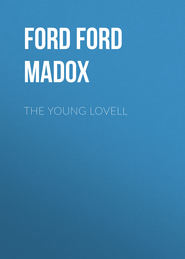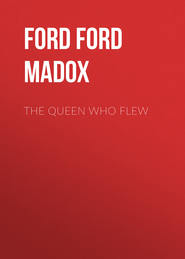По всем вопросам обращайтесь на: info@litportal.ru
(©) 2003-2025.
✖
The Fifth Queen Crowned
Настройки чтения
Размер шрифта
Высота строк
Поля
The King grasped the gilded arms of his great chair, Katharine sat beside him, her hands laid one within another upon her lap. She did not say one single word during the King's interview with Magister Udal.
The Magister fell upon his knees before them and, seeing the laughing wrinkles round the King's little eyes, made sure that he was sent for – as had often been the case – to turn into Latin some jest the King had made. His gown fell about his kneeling shins, his cap was at his side, his lean, brown, and sly face, with the long nose and crafty eyes, was like a woodpecker's.
'Goodman Magister,' Henry said. 'Stand up. We have sent for thee to advance thee.' Without moving his head he rolled his eyes to one side. He loved his dramatic effects and wished to await the coming of the Queen's maid, Margot, before he gave the weight of his message.
Udal picked up his cap and came up to his feet before them; he had beneath his gown a little book, and one long finger between its leaves to keep his place where he had been reading. For he had forgotten a saying of Thales, and was reading through Cæsar's Commentaries to find it.
'As Seneca said,' he uttered in his throat, 'advancement is doubly sweet to them that deserve it not.'
'Why,' the King said, 'we advance thee on the deserts of one that finds thee sweet, and is sweet to one doubly sweet to us, Henry of Windsor that speak sweet words to thee.'
The lines on Udal's face drooped all a little downwards.
'Y'are reader in Latin to the Lady Mary,' the King said.
'I have little deserved in that office,' Udal answered; 'the lady reads Latin better than even I.'
'Why, you lie in that,' Henry said, ''a readeth well for she's my daughter; but not so well as thee.'
Udal ducked his head; he was not minded to carry modesty further than in reason.
'The Lady Mary – the Lady Mary of England – ' the King said weightily – and these last two words of his had a weight all their own, so that he added, 'of England' again, and then, 'will have little longer need of thee. She shall wed with a puissant Prince.'
'I hail, I felicitate, I bless the day I hear those words,' the Magister said.
'Therefore,' the King said – and his ears had caught the rustle of Margot's grey gown – 'we will let thee no more be reader to that my daughter.'
Margot came round the green silk curtains that were looped on the corner posts of the pavilion. When she saw the Magister her great, fair face became slowly of a fiery red; slowly and silently she fell, with motions as if bovine, to her knees at the Queen's side. Her gown was all grey, but it had roses of red and white silk round the upper edges of the square neck-place, and white lawn showed beneath her grey cap.
'We advance thee,' Henry said, 'to be Chancellier de la Royne, with an hundred pounds by the year from my purse. Do homage for thine office.'
Udal fell upon one knee before Katharine, and dropping both cap and book, took her hand to raise to his lips. But Margot caught her hand when he had done with it and set upon it a huge pressure.
'But, Sir Chancellor,' the King said, 'it is evident that so grave an office must have a grave fulfiller. And, to ballast thee the better, the Queen of her graciousness hath found thee a weighty helpmeet. So that, before you shall touch the duties and emoluments of this charge you shall, and that even to-night, wed this Madam Margot that here kneels.'
Udal's face had been of a coppery green pallor ever since he had heard the title of Chancellor.
'Eheu!' he said, 'this is the torture of Tantalus that might never drink.'
In its turn the face of Margot Poins grew pale, pushed forward towards him; but her eyes appeared to blaze, for all they were a mild blue, and the Queen felt the pressure upon her hand grow so hard that it pained her.
The King uttered the one word, 'Magister!'
Udal's fingers picked at the fur of his moth-eaten gown.
'God be favourable to me,' he said. 'If it were anything but Chancellor!'
The King grew more rigid.
'Body of God,' he said, 'will you wed with this maid?'
'Ahí!' the Magister wailed; and his perturbation had in it something comic and scarecrowlike, as if a wind shook him from within. 'If you will make me anything but a Chancellor, I will. But a Chancellor, I dare not.'
The King cast himself back in his chair. The suggested gibe rose furiously to his lips; the Magister quailed and bent before him, throwing out his hands.
'Sire,' he said, 'if – which God forbid – this were a Protestant realm I might do it. But oh, pardon and give ear. Pardon and give ear – '
He waved one hand furiously at the silken canopy above them.
'It is agreed with one of mine in Paris that she shall come hither – God forgive me, I must make avowal, though God knows I would not – she shall come hither to me if she do hear that I have risen to be a Chancellor.'
The King said, 'Body of God!' as if it were an earthquake.
'If it were anything else but Chancellor she might not come, and I would wed Margot Poins more willingly than any other. But – God knows I do not willingly make this avowal, but am in a corner, sicut vulpis in lucubris, like a fox in the coils – this Paris woman is my wife.'
Henry gave a great shout of laughter, but slowly Margot Poins fell across the Queen's knees. She uttered no sound, but lay there motionless. The sight affected Udal to an epileptic fury.
'Jove be propitious to me!' he stuttered out. 'I know not what I can do.' He began to tear the fur of his cloak and toss it over the battlements. 'The woman is my wife – wed by a friar. If this were a Protestant realm now – or if I pleaded pre-contract – and God knows I ha' promised marriage to twenty women before I, in an evil day, married one – eheu! – to this one – '
He began to sob and to wring his thin hands.
'Quod faciam? Me miser! Utinam. Utinam —'
He recovered a little coherence.
'If this were a Protestant land ye might say this wedding was no wedding, for that a friar did it; but I know ye will not suffer that – ' His eyes appealed piteously to the Queen.
'Why, then,' he said, 'it is not upon my head that I do not wed this wench. You be my witness that I would wed; it gores my heart to see her look so pale. It tears my vitals to see any woman look pale. As Lucretius says, "Better the sunshine of smiles – "'
A little outputting of impatient breath from Katharine made him stop.
'It is you, your Grace,' he said, 'that make me thus tied. If you would let us be Protestant, or, again, if I could plead pre-contract to void this Paris marriage it would let me wed with this wench – eheu – eheu. Her brother will break my bones – '
He began to cry out so lamentably, invoking Pluto to bear him to the underworld, that the King roared out upon him —
'Why, get you gone, fool.'
The Magister threw himself suddenly upon his knees, his hands clasped, his gown drooping over them down to his wrists. He turned his face to the Queen.
'Before God,' he said, 'before high and omnipotent Jove, I swear that when I made this marriage I thought it was no marriage!' He reflected for a breath and added, at the recollection of the cook's spits that had been turned against him when he had by woman's guile been forced into marriage with the widow in Paris, 'I was driven into it by force, with sharp points at my throat. Is that not enow to void a marriage? Is that not enow? Is that not enow?'
Katharine looked out over the great levels of the view. Her face was rigid, and she swallowed in her throat, her eye being glazed and hard. The King took his cue from a glance at her face.
'Get you gone, Goodman Rogue Magister,' he said, and he adopted a canonical tone that went heavily with his rustic pose. 'A marriage made and consummated and properly blessed by holy friar there is no undoing. You are learned enough to know that. Rogue that you be, I am very glad that you are trapped by this marriage. Well I know that you have dangled too much with petticoats, to the great scandal of this my Court. Now you have lost your preferment, and I am glad of it. Another and a better than thou shall be the Queen's Chancellor, for another and a better than thou shall wed this wench. We will get her such a goodly husband – '
A low, melancholy wail from Margot Poins' agonised face – a sound such as might have been made by an ox in pain – brought him to a stop. It wrung the Magister, who could not bear to see a woman pained, up to a pitch of ecstatic courage.
'Quid fecit Cæsar,' he stuttered; 'what Cæsar hath done, Cæsar can do again. It was not till very lately since this canon of wedding and consummating and blessing by a holy friar hath been derided and contemned in this realm. And so it might be again – '












